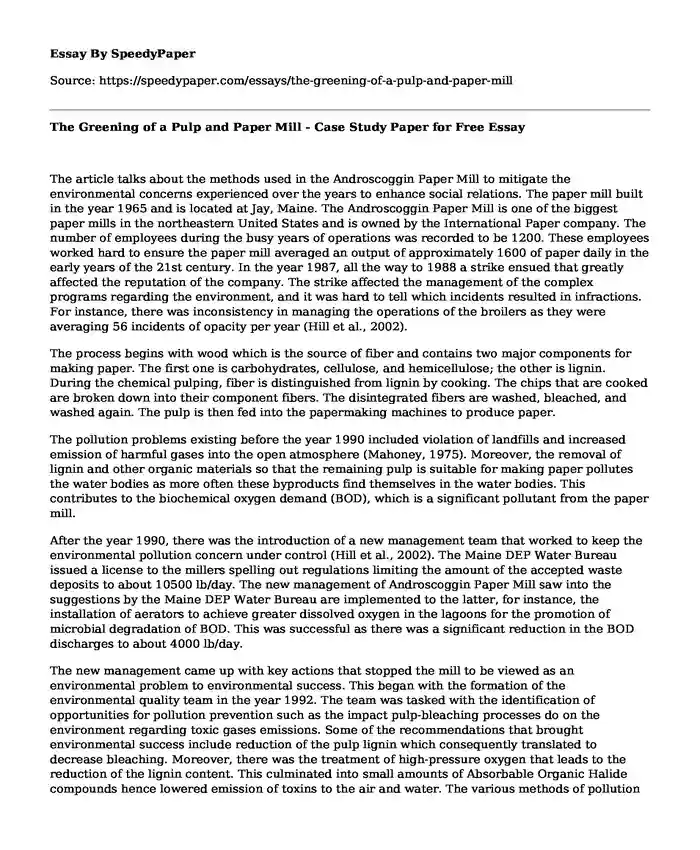The article talks about the methods used in the Androscoggin Paper Mill to mitigate the environmental concerns experienced over the years to enhance social relations. The paper mill built in the year 1965 and is located at Jay, Maine. The Androscoggin Paper Mill is one of the biggest paper mills in the northeastern United States and is owned by the International Paper company. The number of employees during the busy years of operations was recorded to be 1200. These employees worked hard to ensure the paper mill averaged an output of approximately 1600 of paper daily in the early years of the 21st century. In the year 1987, all the way to 1988 a strike ensued that greatly affected the reputation of the company. The strike affected the management of the complex programs regarding the environment, and it was hard to tell which incidents resulted in infractions. For instance, there was inconsistency in managing the operations of the broilers as they were averaging 56 incidents of opacity per year (Hill et al., 2002).
The process begins with wood which is the source of fiber and contains two major components for making paper. The first one is carbohydrates, cellulose, and hemicellulose; the other is lignin. During the chemical pulping, fiber is distinguished from lignin by cooking. The chips that are cooked are broken down into their component fibers. The disintegrated fibers are washed, bleached, and washed again. The pulp is then fed into the papermaking machines to produce paper.
The pollution problems existing before the year 1990 included violation of landfills and increased emission of harmful gases into the open atmosphere (Mahoney, 1975). Moreover, the removal of lignin and other organic materials so that the remaining pulp is suitable for making paper pollutes the water bodies as more often these byproducts find themselves in the water bodies. This contributes to the biochemical oxygen demand (BOD), which is a significant pollutant from the paper mill.
After the year 1990, there was the introduction of a new management team that worked to keep the environmental pollution concern under control (Hill et al., 2002). The Maine DEP Water Bureau issued a license to the millers spelling out regulations limiting the amount of the accepted waste deposits to about 10500 lb/day. The new management of Androscoggin Paper Mill saw into the suggestions by the Maine DEP Water Bureau are implemented to the latter, for instance, the installation of aerators to achieve greater dissolved oxygen in the lagoons for the promotion of microbial degradation of BOD. This was successful as there was a significant reduction in the BOD discharges to about 4000 lb/day.
The new management came up with key actions that stopped the mill to be viewed as an environmental problem to environmental success. This began with the formation of the environmental quality team in the year 1992. The team was tasked with the identification of opportunities for pollution prevention such as the impact pulp-bleaching processes do on the environment regarding toxic gases emissions. Some of the recommendations that brought environmental success include reduction of the pulp lignin which consequently translated to decrease bleaching. Moreover, there was the treatment of high-pressure oxygen that leads to the reduction of the lignin content. This culminated into small amounts of Absorbable Organic Halide compounds hence lowered emission of toxins to the air and water. The various methods of pollution prevention escalated through to the year 2002 where there was the introduction of extended delignification (Hill et al., 2002).
References
Hill, M., Saviello, T., & Groves, S. (2002). The Greening of a Pulp and Paper Mill. The Journal Of Industrial Ecology, 6.
Mahoney, J. (1975). Model validation and air quality evaluation for the Androscoggin Mill, Jay, Maine. Concord, Mass.: Environmental Research & Technology
Cite this page
The Greening of a Pulp and Paper Mill - Case Study Paper for Free. (2022, Jun 20). Retrieved from https://speedypaper.com/essays/the-greening-of-a-pulp-and-paper-mill
Request Removal
If you are the original author of this essay and no longer wish to have it published on the SpeedyPaper website, please click below to request its removal:
- Free Essay about the Contribution of International Trade
- Free Essay for You: Philosophy of Language, Frege and Russel
- Illness & Loss - Free Essay on Grief
- Article Review Essay Example on the Effect of Television Programming on the Public
- Students Coping W/ Bullying/Victimization: Strategies & Models. Free Essay
- Paper Example on How Social Media Creates Inaccurate Perceptions of People
- Essay Sample on Comparative Statistics on The Health Systems
Popular categories





